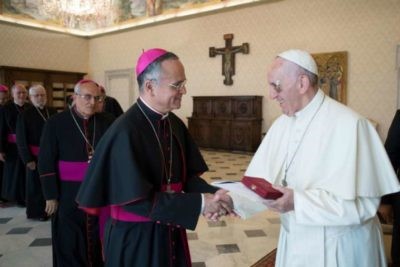– Tej Francis
MANAGUA, NICARAGUA
NICARAGUAN BISHOP TO GO TO ROME AMID SECURITY CONCERNS
(CNA) Pope Francis has asked Auxiliary Bishop Silvio José Báez Ortega of Managua to serve the Church in Rome for a temporary period. Báez has faced security concerns as a vocal critic of the administration of Nicaraguan president Daniel Ortega. Báez said in a press conference April 10 that he did not ask to leave Nicaragua, but that he will be obedient to the pope’s request.
“I have not asked to leave Nicaragua. The Holy Father called me,” he said. “I want to make it clear that my heart has always been here in my land, in my homeland and in the midst of my people. My pastor’s heart will remain here in Nicaragua,” he told media. The bishop said that he will carry Nicaragua in his heart, but that “this decision of the Holy Father, that I accepted and assumed, has made my heart cry.”
Cardinal Leopoldo José Brenes Solorzano of Managua said the pope’s request was made during a private audience with Báez at the Vatican several weeks ago. Brenes explained that Báez will remain an auxiliary bishop of Managua during the undetermined period he is away from the diocese, and that he will go to Rome during the Easter season, after the busy schedule of Holy Week has concluded. Báez, who has been the subject of threats because of his outspoken opposition to the Ortega administration during the crisis facing the country, said threats have not “paralyzed my ministry” or stopped him from sharing the Gospel and giving “constructive criticism.”
CONCORD, N.H.
N.H. DEATH PENALTY REPEAL BID CALLED ‘AN ENORMOUS VICTORY FOR LIFE’
(Catholic News Agency) The New Hampshire Senate’s vote to repeal the death penalty is “an enormous victory for life,” according to the executive director of the Catholic Mobilizing Network. The New Hampshire Senate voted 17-6 April 11 to repeal the state’s death penalty law. This follows a 279-88 vote for repeal by the state House in March. “The overwhelming margins by which the repeal bill passed through the Legislature sends a strong message about the state’s priority to put an end to the death penalty,” said an April 12 statement by Krisanne Vaillancourt Murphy. “It speaks to a long-term decline in support for capital punishment found not only in New Hampshire, but across the United States as a whole.”
New Hampshire Gov. Chris Sununu has threatened to veto the bill, but the original vote in each chamber passed by margins wide enough to override a veto. A two-thirds vote is required to override. “Catholic Mobilizing Network celebrates this encouraging progress and looks forward to the day when the state officially unshackles itself from the death penalty once and for all,” Murphy said.
New Hampshire has not put a prisoner to death since 1939. However, there is one man on the state’s death row, but the state’s corrections department said there are no immediate plans to acquire the drugs necessary to execute him. New Hampshire is the last state in New England where the death penalty is still on the books. In March, Gov. Gavin Newsom imposed a moratorium on executions in California, the nation’s most populous state — and most populous death row, with 737 men and women.
SOFIA, BULGARIA
BULGARIAN ORTHODOX: NO COMMON PRAYER FOR THEIR CLERGY DURING PAPAL VISIT
(Catholic News Agency) Bulgaria’s predominant Orthodox Church has ordered its clergy not to take part in prayers or services with the pope when he visits the country in early May. “The invitation to Pope Francis comes from the state authorities, so it is appropriate that the main events are coordinated with state institutions,” the church’s 15-member governing Holy Synod said in a statement. “Any form of service with a common liturgical or prayerful character, including the use of liturgical garments, will be unacceptable to us. Our holy canons do not permit this.” The synod said it had agreed the ban unanimously after examining a draft agenda for the pontiff’s May 5-7 visit and would confirm it in a letter to the Vatican’s nuncio, Archbishop Anselmo Pecorari.
It said Bulgarian Orthodox Patriarch Neophyte would greet the pope with other church leaders at Sofia’s Synodal Palace and Orthodox cathedral, but said the participation of Orthodox clergy, including the church’s patriarchal choir, in other events was “impossible,” while an Orthodox interpreter would only be available during the palace and cathedral events.
Francis will meet Prime Minister Boyko Borissov and President Rumen Radev during the three-day pilgrimage, which will include an interfaith peace vigil in the capital’s Independence Square and stopover at a refugee camp. The itinerary features an outdoor Mass in Sofia’s Battenberg Square, and a visit to Rakovski, a largely Catholic town in central Bulgaria.
“We have done many useful things with Catholics, such as in the care of overseas dioceses, mixed marriages and theological scientific cooperation,” Deacon Ivanov said. “But it should be noted the pope always respects requirements in the respective host country, in this case from the Bulgarian Orthodox Church, and this is reflected in the relevant visit protocols.” After he leaves Bulgaria May 7, Francis will visit neighboring North Macedonia, which declared independence from the former Yugoslavia in 1991.


 Follow
Follow


